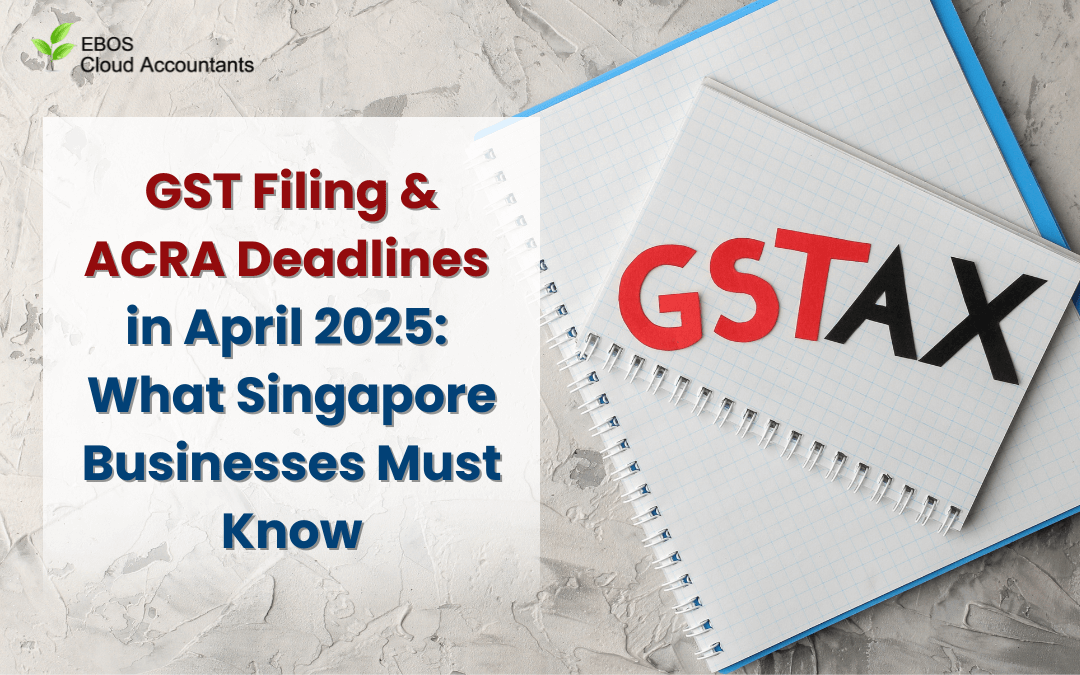Staying compliant with Singapore’s tax and corporate regulations is essential for all businesses. As April 2025 approaches, two key filing deadlines require attention—Goods and Services Tax (GST) filing with the Inland Revenue Authority of Singapore (IRAS) and Annual Return submission with the Accounting and Corporate Regulatory Authority (ACRA). Missing these deadlines can result in penalties, late fees, or compliance issues.
GST Filing Deadline: 30 April 2025
Who Needs to File GST?
All businesses that are GST-registered must file their GST returns with IRAS on a periodic basis. The filing frequency depends on your company’s assigned schedule:
- Quarterly Filing: If your company follows the standard quarterly filing schedule, the GST return for Q1 2025 (January – March 2025) is due by 30 April 2025.
- Monthly Filing: If you have opted for monthly GST filing, you must submit your return for March 2025 by 30 April 2025.
How to File GST in Singapore
To complete your GST F5 return, follow these steps:
- Prepare Financial Records – Ensure that your sales, purchases, and expenses are properly recorded.
- Access myTax Portal – Log in to IRAS myTax Portal using your CorpPass credentials.
- Submit Your GST F5 Return – Accurately report your taxable sales and claimable input tax.
- Make Payment (If Applicable) – If your GST return reflects a payable amount, ensure payment is made before the deadline to avoid penalties.
Penalties for Late GST Filing
Failing to file or pay your GST on time can result in:
- Late Submission Penalty: A $200 fine for each outstanding GST return, increasing by $200 every month (up to a maximum of $10,000).
- Late Payment Penalty: A 5% penalty on unpaid tax, followed by an additional 2% per month if left unpaid.
To avoid these penalties, businesses should plan ahead and ensure timely submission.
ACRA Annual Return Deadline: 30 April 2025
Who Needs to File the Annual Return?
All Singapore-incorporated companies must file an Annual Return with ACRA. The deadline depends on the financial year-end (FYE) of the company.
- If your company’s financial year ended on 31 December 2024, you must submit your Annual Return by 30 April 2025.
- Exemptions apply to some small exempt private companies (EPCs), but most companies still need to file.
How to File the ACRA Annual Return
- Prepare Financial Statements – Ensure that your company’s financial statements are finalized and ready for submission.
- Log in to BizFile+ – Access the ACRA BizFile+ portal using your CorpPass account.
- Submit the Annual Return – Provide key company details, including shareholding information and directors’ statements.
Penalties for Late ACRA Filing
Failure to meet the deadline can lead to:
- A late filing penalty of up to $600.
- Possible striking off of the company from ACRA’s register if non-compliance continues.
Directors may also face enforcement actions if the company does not meet regulatory requirements.
How to Ensure Compliance & Avoid Penalties
To avoid last-minute stress and penalties, businesses should adopt these best practices:
✅ Set Reminders: Schedule alerts for key deadlines to avoid missing important filings.
✅ Use Accounting Software: Cloud accounting solutions help track GST transactions and generate reports automatically.
✅ Hire a Corporate Secretary: Many businesses engage professional corporate secretarial services to handle ACRA filings.
✅ Engage a Tax Consultant: If your GST calculations are complex, consider hiring a tax professional to ensure accuracy.
Conclusion
April 2025 is a critical month for businesses in Singapore, with both GST filings and ACRA Annual Returns due. Preparing early, keeping accurate financial records, and leveraging professional services can help ensure smooth compliance and avoid unnecessary penalties.
If you’re unsure about the process or need assistance, consulting an accountant or corporate secretary can be a smart move to keep your business compliant and penalty-free. Check out our website at https://ebos-sg.com/ to explore more articles and discover how our Cloud Accountant Services can support you on your business.







